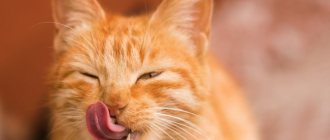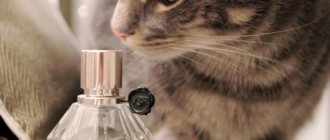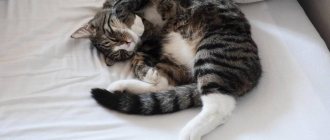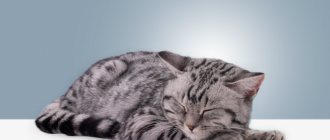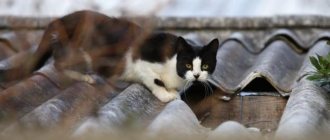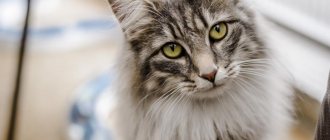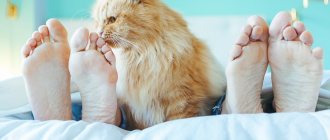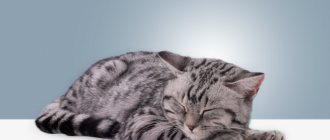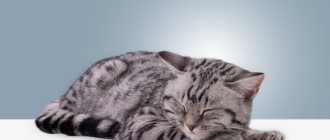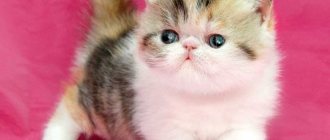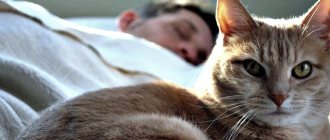So, you lay down on the bed with your arms raised. And your cat came up and started licking your armpits. Your pet does this every time she gets the chance. But why does he like to lick your smelly, sweaty armpits?
The simplest answer is that your cat is grooming you. This means your cat is comfortable with you. Your cat grooms you the same way she grooms kittens, cleaning up smelly leftovers. Cats also like it because your sweat has a salty taste, and cats like that taste.
But are there any health risks? Are there other reasons why your cat licks your armpits? Read below to know more about this strange behavior.
How to wean it off?
In order for a cat to stop sucking a blanket, the very first thing you need to do is eliminate or reduce the number of objects around that can be used for sucking.
No source, no problem. You can repel with a spray bottle of water or aromatic oils with citrus scents. Veterinarians also insist on conducting a full examination and identifying possible causative diseases or complications. If a deficiency of nutrients and vitamins is detected, the cat is prescribed a special diet. It is important to distract the student from unwanted games. Especially important are those that will develop trust between the purr and the owner.
When you see your pet doing an obscene activity, you need to distract him for at least 10-20 minutes so that the cat’s brain has time to switch. At the end of the game, you can pet the animal or offer it a treat. Then he will enjoy the entertainment, and not from sucking on the blanket. It is important to provide the child with toys that will not let him get bored during the day when the owners are at work.
Breeders remind you that care should be taken to have several scratching posts, high shelves or a whole complex. The tray and feeding area should be kept clean. Then the animal will feel comfortable and safe. You should never punish or beat for bad behavior or strange addictions.
On the contrary, you need to surround your pet with care, affection and attention, then he will not have the desire to attract attention to himself by sucking on a blanket
Why are cats attracted to human sweat?
One of the strange manifestations of a cat’s affection for its owner is the cats’ love for unpleasant, specific odors. Some owners note that their pets are addicted to the smell of sweat. Don't be surprised if cats lick your armpits, lick your hands, face, head. Concentrated odors of humans, in particular the owner, and family members have a calming effect on cats.
Cats love to lick their armpits for the following reasons:
- Sweat contains hormones similar to pheromones, which cats use to attract members of the opposite sex.
- The strong, pungent smell of sweat has a calming effect on cats.
- The cat needs enough salt, and as you know, sweat contains a large amount of sodium salts and other minerals.
- Adult animals react to sweat in the same way as to catnip, mint, and valerian. Catnip contains a special pheromone that mimics the pheromones of cats ready to mate. Mint and valerian have a relaxing effect.
- If a cat walks on the street and, returning home, begins to rub against clothes and shoes, it interrupts third-party aromas with “family” ones, that is, the owner’s.
shutterstock
Some cats perceive human sweat with a secretion secreted by glands located on the animals' cheeks. Therefore, if a cat rubs against its owner, it leaves its scent there, noting that it is part of a pride.
According to another theory, if a cat constantly licks his hands, face, and shows interest in clothes, thus he shows his affection, the highest degree of trust.
As you can see, there is nothing wrong with the fact that cats are attracted to human-specific aromas. If the cat receives a balanced diet and is not subject to frequent stress, do not be alarmed by the fact that the pet shows interest in your clothes or licks your armpits, head, or hands.
https://youtube.com/watch?v=qUZdtK-toTg
Method of communication
One of the main ways animals communicate is through chemicals called pheromones. Smell plays a big role in a cat's life. There are a huge number of glands on the cat's body that produce odorous substances. They are concentrated on the temples, in the corners of the mouth, on the chin, at the base of the tail and along it. There are slightly fewer glands on the sides. The glands on the head secrete substances that carry more individual information, while the glands in the tail secrete group information.
The secretions on the face of the house cat contain more than 40 chemicals. About 13 are characteristic of all cats, but the rest are very individual. Leaving her scent on people and objects, the cat seems to be attaching a name plate. But even “general” pheromones are not released simultaneously.
Consequently, a pet has enough means in its arsenal to express one or another state.
By licking its owner and then applying new marks, the kitty leaves messages for us and its relatives.
Researchers have so far deciphered only 5 “functional” fractions, which they conventionally called F1-F5. These are smells that indicate anxiety, stress, or soothing and peaceful. Being born blind, the kitten reacts to the smell of its mother cat. It calms the baby, gives him a feeling of security and confidence.
Natural reflex
It is important to know that licking is a natural and unconditioned reflex of absolutely all cats. Intense nose licking occurs at the sight of food
shutterstock
While you are serving food, the cat is constantly swallowing and licking, and this is considered normal.
During sleep, cats may often lick their lips due to the fact that their nose dries out due to dulling of the receptors.
Thirst can also cause licking. The cat must have 24/7 access to water. In hot weather, it needs to be changed several times a day. This is especially true for pets who eat only dry food.
The stress suffered can also be expressed in intense licking of the muzzle, paws or sides. Initially, it may seem that she is itching from fleas. Emotions and various shocks play an important role in the life of tailed pets, and can negatively affect their well-being and behavior.
Cats greet each other by sniffing their butts
Butt sniffing is a socially acceptable and healthy form of communication between cats. The smell of a cat's butt can provide a lot of information.
The cat's rectum contains the anal glands. These are two small sacs, through two holes that release an unpleasant-smelling substance into the rectum. A cat's anal glands empty each time her rectal sphincter contracts during bowel movements.
However, it can be difficult for owners to detect the odor of the anal glands because the odor is overwhelmed by the smell of your cat's feces. Cats have a more acute sense of smell and can therefore tell them apart.
Signs of poisoning
The consequence of a situation where a cat licks flea drops can be poisoning. However, this does not happen to every animal. The condition of the cat in this case depends not only on its immune system, but also on the amount of insecticide that has entered the body.
- Refusal of food - especially lack of appetite is noticeable if the pet does not respond to previously favorite dishes.
- Thirst - the animal’s frequent desire to drink water is explained by its efforts to remove poison from the body in this way.
- Profuse salivation. Sometimes this process is so aggravated that you can even see foam at the cat’s mouth.
- Diarrhea - loose stools may persist for several days.
- Lethargic and passive behavior, loss of activity.
- Severely dilated pupils.
- Loss of orientation may also occur (the cat spends a long time preparing to jump).
The presence of such symptoms indicates that the cat has been poisoned by flea drops.
- severe itching accompanied by allergies;
- excessive lacrimation and salivation; if your pet has such symptoms, constant access to drink is necessary;
- the formation of bald patches in places where anti-flea drops are applied.
Pheromones
Animal psychologists explain the cats' addiction to the smell of their owner's armpits by the presence of pheromones in their sweat. Especially when the cat goes into heat. The animal enjoys the smell of its owner's sweat so much that it simply cannot be pulled away from the armpit.
Compared to humans, cats have a more sensitive sense of smell. They are able not only to distinguish pheromones, but also to navigate the hormonal background of their owner. For example, cats will actively sniff a woman when she is pregnant.
Is licking owners dangerous?
If the animal is healthy, then there is no danger for humans in licking it. Moreover, animal psychologists do not advise rejecting your pet at this moment, even if it is unpleasant for you.
Some even believe that cats sense their owner’s sore spots and heal them with their energy by licking him.
The behavior of pets can be studied over a long period of time. Some lick themselves right down to their bald patches, causing damage to their health. Others may lick people to show their feelings.
In any case, it is worth understanding that licking itself is a problem.
We need to fight it. Whereas such a procedure will not bring danger to humans. This is provided that the pet is absolutely healthy.
www.icatcare.org
Excessive licking (Over-grooming) of the fur is considered to be the behavior of a cat when it licks itself more often than necessary to keep the fur clean and give it the desired smell.
Signs of overgrooming are the formation on the cat’s body of areas with broken or sparse hair, and in more severe cases, areas with a complete absence of hair, sometimes even with damage to the lower layers of the skin. In extreme cases, a cat may even chew or bite the skin, usually on the paws or tail, injuring itself to such an extent that (in the case of the tail) may even require partial amputation. An overgrooming cat may lick, chew, bite, or pluck its hair or skin, and this behavior may be difficult to correct.
Expression of affection
If you've ever observed a group of cats, you've probably noticed that members of the same group lick each other. This phenomenon is called “allogrooming”. Its meaning includes caring for the fur of other individuals of the same group. This phenomenon does not only occur in cats. Through such actions, animals show affection, care, and a desire to strengthen bonds with members of the social group. Such actions help reduce conflict among community members. Living in close contact with humans, the animal perceives people as members of its group.
Cats use allogrooming to demonstrate their affection. In a similar way, cats demonstrate to the owner the desire to be a member of the same community and to have the opportunity to communicate. If the animal is healthy and licks your hands, it means it is attached to you and does not mind closer communication.
Why are cats attracted to specific smells?
Attentive owners of furry pets may have noticed that cats show special interest in smells that are unusual, in human opinion. For example, cats love the smell of dirty clothes, unwashed socks or sweaty armpits. Thus, some kittens and adult pets like to sleep on unwashed linen, put their muzzles in shoes or enjoy “poking” into the armpits, while preferring more male ones. What causes this behavior, why do cats lick their armpits?
shutterstock
First of all, don’t be scared and think that your pet has gone crazy. The thing is that representatives of the cat family have a much better developed sense of smell than humans. Cats can detect odors and aromas that are not sensitive to our noses and at the same time feel them much more strongly.
Smells can attract or, conversely, repel cats. For example, cats simply adore human sweat. Animals like the smell of their owner's clothes and shoes. It is worth noting that such “scents” attract more adult cats than kittens. Babies show less interest in strong aromas and use their owner's clothes or socks as new toys.
Predatory instinct of cats
Cats, like their larger relatives, are predators. They can sit in ambush for a long time, hiding and waiting for the right moment to attack. To do this, they certainly need to mask their smell and merge with the numerous aromas of the environment. In this case, household items that smell strongly of sweat are ideal.
Read also: Why does the eye twitch due to signs?
Cats do not regard sweat as a sign of uncleanliness. For them, this is the natural smell of a living creature.
No one knows for sure what the reasons for this behavior are.
Genetics plays a certain role (most cats that demonstrate this behavior are oriental breeds (Siamese, Burmese, etc.) or their crosses), as well as early weaning of the kitten from the mother's breast. Young kittens have a very strong sucking instinct, and early weaning upsets cats' natural instincts and promotes this behavior.
Early weaning leads to kittens sucking their owners' earlobes, their fingers, or trying to suckle other pets. Kittens should never be taken away from their mothers before 8 weeks of age, and should ideally remain with them until at least 12 weeks of age.
Symptoms of diseases
There are cases when licking people is a desire to draw attention to the pet’s health problems, and not a show of love or a request for affection. These may be diseases or conditions such as:
Skin parasites, including fleas. The cat worries not only about itself, but also about the people around it, and is trying to get rid of the problem. Allergy. If feeding is incorrect or the food is changed, skin problems can occur, which leads to excessive licking of yourself and those around you. Disturbances in general health. By frequent licking, the animal is trying to signal that something is wrong with it.
It is important to notice changes in behavior and contact a veterinarian promptly. Infectious diseases. Some of them cause itching and rashes on the skin, which irritates the pet and he tries to get rid of it in this way.
Obeying the basic instinct
The periods of cat “weddings” are known for their riotousness - and individuals of both sexes are prone to an enchanting outpouring of feelings. Expressing desire with inviting cries, characteristic poses and “fragrant” marks, but not being able to find a partner, temperamental pets can “trample” with their paws or bite the owner, lick him annoyingly and rub his whole body, marking him with his smell.
Cats sometimes imitate mounting and mating by squeezing a person's hand with their teeth, just as they would grab the scruff of a cat in heat.
World of cat scents
By the way, cats also have unloved odors:
- Cats are not fond of citrus scents. If you put the skins of oranges or lemons in the pot of a flower that your pussy is nibbling on, it will ignore that place.
- You can spray the area where you don't want a cat's presence with acetic acid. Cats cannot stand this smell. It will seem to a person that it has disappeared within just a few minutes, but your mustachioed friend will feel it for a very long time.
- Lavender, mint, and rue are suitable as natural “horror stories.” They can be placed in a garden area where there is no place for cats.
- You can buy cat repellent spray in specialized stores. The method of application is simple: where the cat has adapted to walk “big”, you need to spray the spray. Animals avoid such places; they don’t like them.
A person in modern society is simply obliged to observe the rules of personal hygiene, smell nice and look neat.
But what to do if all the rules are followed, but an unpleasant odor still emanates from the body? Every person, under certain conditions, tends to sweat. The smell of sweat is different for everyone, but it happens that the sweat takes on a sour smell, the smell of ammonia, vinegar, or even worse - the sweat smells like cat urine. Human sweat consists of 99% water, and 1% urea, salts, acids and other chemical compounds. If he starts to smell like cat urine, this indicates an increased secretion of urea and uric acid. These substances settle on the hairs in the form of crystals and cause unpleasant odors. Moreover, a similar phenomenon is observed in both women and men. People’s first reaction: what will others think of me, will they judge me, criticize me. But in this situation, you need to think not about the gossip around you, but about your own health, since any unpleasant body odor can be a symptom of very serious diseases of vital organs. In this case, get tested as soon as possible.
Causes of odor
Human sweat glands are divided into two types: apocrine and eccrine. With any increase in body temperature, the eccrine glands begin to work intensively, trying to normalize the temperature in order to prevent the body from overheating. When these glands operate, a substance consisting of water and various salts is released. Eccrine glands are located virtually throughout the body and have access to the surface of the skin.
The largest concentration of these glands is on the palms and soles of a person’s feet. Apocrine glands are associated with the hair of the body, therefore they are located mostly in the armpits and in the genital area. When working, these glands secrete a cloudy liquid that is odorless until it encounters bacteria on the skin surface.
Apocrine glands come into play during puberty, as well as during psychological stress in the body.
If you carefully monitor your personal hygiene, use deodorizing products, but at the same time you still have an unpleasant body odor, sweating has increased significantly, even without any active actions, you should not delay a visit to a specialist, as this may be a sign of a serious illness .
Reasons for refusing food
Many owners often perceive refusal of food as a serious symptom of the development of a serious disease in the animal. It is not always so. There are completely harmless reasons why a cat’s appetite decreases:
Change in diet. Cats are very conservative creatures, and the slightest changes in their living conditions cause them stress. Changing the brand of food when feeding dry or canned food, or introducing new foods into the diet may be met with hostility by the animal, and it does not want to eat unfamiliar food.
At first, if there is a change in diet, the pet may go on a complete hunger strike. Therefore, experienced owners, if necessary, make adjustments to the diet, do this gradually, gradually adding unfamiliar components to the foods familiar to the cat.
If the cat has stopped eating and drinking, then this condition indicates a serious illness, and it is impossible to delay the provision of veterinary care. Refusal of food and loss of appetite accompany almost all diseases in animals.
The owner should pay attention to the pet’s behavior, measure the temperature, monitor stool and urine output
According to the results of a scatological study
helminths and protozoa can be detected. A fecal occult blood test will help detect intestinal pathology and diagnose tumor processes.
The facility will take a blood test
for general and biochemical research. The results will help identify diseases of the pancreas, liver, and detect inflammatory processes.
If the cat is sick and does not eat anything, to exclude the infectious nature of the disease, a veterinarian will prescribe a bacteriological or virological test
.
Unpleasant odor in women and men
In earlier times of our past, when medicine was poorly developed, an experienced doctor could make a diagnosis by the smell of sweat.
When visiting a dermatologist, he will ask you about the presence of stressful situations, how often does the smell of urine appear, does anything affect its change, do you notice that the smell may decrease or worsen? You will also need to take blood and urine tests. If necessary, even sweat can be examined.
Don’t be surprised, because the smell of cat urine when sweating in women and men can be caused by an infection in the body, and it can also be a sign of diabetes. It is also worth paying attention to the medications you have taken recently, especially if they are antibiotics or antidepressants made with penicillin.
With an abundance of chemical compounds and unnecessary substances in the body, the liver cannot cope and performs its functions in a weakened mode, which can also cause an unpleasant odor.
If you have food poisoning or an infection, your liver and kidneys can react by releasing large amounts of toxins into your bloodstream, which also leads to the smell of cat urine. This reaction is called Uridrosis.
Uridrosis is dangerous not because of unpleasant odors, but because dangerous processes of inflammation of internal organs arise in the body, which in turn leads to kidney or liver failure.
Athletes who consume protein often face the problem of unpleasant body odor. Such an organism contains a lot of protein, which must be compensated for by carbohydrates. With a lack of carbohydrates, the body's excretory system cannot cope with proteins, which provokes an unpleasant odor of cat urine from the body.
Unpleasant body odor can also be caused by hormonal changes, menopause in women, and puberty in adolescents.
Often, the food we eat also causes unpleasant body odor. In this case, spicy, fried and spicy foods, as well as drinks containing caffeine, should be excluded from the diet. Eat more vegetables and fruits. It is not recommended to drink a lot of beer, as it disrupts kidney function.
In any case, it is better to contact a specialist in time.
Along with inflammatory processes, sweat can smell like cat urine due to heredity. In this case, your assistant will be regular showers, baths with the addition of decoctions of various herbs that have antiseptic properties, peony flowers, chamomile, sage, thyme. If possible, wear clothes made from natural fabrics that allow your skin to breathe.
Buy yourself deodorants, preferably alcohol-based, which creates an acidic environment that prevents bacteria from growing and neutralizes the smell of sweat. Walk outdoors more often, if possible visit the pool or sauna. Lead a healthy lifestyle, make sure your diet is correct, eat more fresh fruits and vegetables, and do not overeat. Stop smoking and alcohol, especially beer.
Don’t forget that there are now excellent remedies that eliminate the causes of sweat smelling like cat urine in men and women. Find out more!
Symptoms of diseases
In some cases, excessive licking of household members may not be the result of the animal’s desire to attract attention and demands for affection, but a manifestation of some kind of disease. For example:
- Fleas and other skin parasites. The cat tries to get rid of annoying insects not only itself, but also to protect the rest of the family members.
- Allergic skin reactions. Irritation can be caused by incorrectly selected shampoo, various cosmetics, tobacco smoke and other unpleasant odors. As a result, the cat feels discomfort and tries to solve the problem by licking itself and “for the company” of its owner.
- General malaise. With the help of licking, the pet lets you know that something is wrong with it and asks you to take care of itself. If such behavior was not previously typical for the cat, then you need to carefully monitor its well-being and, if necessary, have it examined by a veterinarian.
- Infection. Secondary signs of a number of infectious diseases are skin rashes. They often itch intensely, itch and cause severe discomfort to the cat. Trying to protect herself from unpleasant sensations, she strives to lick not only herself, but also her owner, and in some cases even surrounding objects.
The sense of smell is the main organ
Animals, unlike people, don’t just smell – they read it.
The sense of smell for cats is known to be extremely important. Thanks to this organ, cats find a partner for mating, hunt, and receive information. It is also an organ of communication. The main task of the sense of smell is to notify the cat for a lightning-fast reaction: with its help, she finds out what the smell carries - a threat or unpleasant sensations or, conversely, pleasure. Thanks to smells, animals navigate the environment, delimit territory, etc. Traces of memory about various aromas are never erased or dulled in the cat’s brain, but are forever fixed in the center of long-term memory, as if in a bank of smells. Aromas that are seductive and attractive to our smaller brothers can be repulsive to humans. Just like a neutral smell that is not memorable for a person can be extremely important for his beloved pets.
Therefore, cat aspirations in the form of biting, sucking shoes, socks, shirts and armpits and rubbing against them may seem strange to the owners. But in fact, this is a completely ordinary and widespread phenomenon. Some cats adore the smell only of their owners, while others are interested in every guest. And pets most often feel true bliss from such aromas.
Human sweat, from the point of view of cat curiosity, represents a rich palette of feelings for our smaller brothers, from a relaxing effect to an exciting effect. However, there may be other explanations for this bias.
Raising cats - how to wean cats from “bad” habits?
With their legendary curiosity, cats can cause a lot of trouble. But tailed pets are difficult to train; you need a lot of patience. For those who do not want to bother themselves with such difficulties, you can take into account the dislike of cats for certain smells. This will help scare away the mustachioed striped ones from those areas where they do not belong. What smell do cats not like?
- Cats hate citrus scents. If you crumble the skins of oranges or lemons into a flower pot that your cat has gotten into the habit of nibbling, she will no longer come near it.
- You can spray the area where you don't want a cat's presence with vinegar. Cats hate him. For humans, the vinegar smell will become invisible after a few minutes, but cats will smell it for much longer.
- Lavender, mint, and rue can also act as natural scarecrows. They can be planted in a garden area where the presence of cats is undesirable.
- You can buy cat repellent spray at pet stores. The method of using it is simple: where the cat has become accustomed to shitting, you need to spray it with a spray. Cats avoid such places; they don’t like them.
- Cats are also repelled by essential oils made from lemongrass or orange. You can prepare a mixture based on rosemary, cinnamon and lemongrass by adding three parts of water.
The mixture should be sprayed daily until the cat realizes that these places should not be approached. After a long time, the pet may forget unpleasant associations and return to forbidden places. Therefore, the owner will have to repeat spraying from time to time. You can also not spray the solution, but make cotton balls, dip them in the product and scatter them where needed.
Useful materials:
- Cutaneous horn General description of the disease Cutaneous horn on the forehead or face (ICD 10 code - L57.0) -...
- The cat has cancer Stages of mammary gland cancer in cats Like in humans, cat mammary cancer has ...
- Itching and odorless discharge Main causesBefore considering the factors that provoke the appearance of discharge that has a sour odor, it is necessary to immediately note...
- Normal temperature in animals Normal temperature in different types of animals Veterinary services Day hospital for animals Veterinary certificates Vaccination…
Advantages and disadvantages
Armpit waxing is a popular service in salons and specialized hair removal centers. The high demand for the procedure is due to the fact that the procedure has more advantages than disadvantages.
Positive aspects of depilation :
- Long lasting effect. One procedure helps you forget about unwanted hair for up to 4 weeks.
- Over time, hairs become thinner and grow more slowly.
- Thanks to the healthy oils and vitamins included in professional hair removal products, the skin is transformed.
- The risk of allergies and irritation is minimal.
- High speed. With all the preparation steps, a professional master can remove hair from two armpits in 10-15 minutes.
Negative sides:
- There is a need to repeat the procedure. The hair is removed from the root, but after some time a new hair begins to grow from the same follicle.
- The procedure may be painful. It depends on the individual characteristics of the organism.
- In order to remove hair efficiently, its minimum length should be 4-5 mm.
How to help a cat
To help your cat, you need to determine the root cause of the behavioral problem. If the cause lies in diseases, the veterinarian will prescribe symptomatic therapy using medications for general and local treatment.
After treatment, you need to take your cat to the clinic several times a year for a comprehensive examination. If overgrooming is caused by chronic pathologies, relapses are possible.
Vitamin and mineral preparations, food additives, and animal shampoos that have an antiseptic and anti-inflammatory effect will help restore the coat.
Previous Question and answer5 reasons why a cat licks his armpits Next Question and answer7 reasons why a cat licks his balls
What to do if a cat licks itself until it has bald patches and wounds?
The most reasonable solution in this situation is to show your four-legged pet to a veterinarian. An attempt to help a pet on your own is fraught with serious consequences for its health, since it is impossible to determine at home what exactly led to such unusual behavior of the animal.
The veterinarian will prescribe an examination for the four-legged patient and identify the cause of persistent licking, accompanied by exposure of the skin and the appearance of wounds on it. If parasites are the culprit of the cat’s behavior, she will be prescribed antiparasitic veterinary medications. If it turns out that the source of the problem is a malfunction of any internal organ, the cat will be prescribed appropriate treatment.
It is not always necessary to treat a pet that licks its skin to bald spots. Sometimes it’s enough to simply calm him down by creating a calm atmosphere in the house, or give him a bath if he thinks his fur smells of something unpleasant. In the latter case, you need to use zoo shampoos - they do not contain fragrances.
How cats use the smell of human sweat to camouflage and express love for him.
Disguise
Cats by nature are predators and are accustomed to camouflage themselves so as not to stand out from their environment. And from the surrounding odors as well. It was these skills that allowed and allow wild cats to hunt. And the domestic cat happily rubs against the sweaty clothes of its owners and plays with a dirty sock.
True love
Sweating is the result of a person’s hard work, some strong experiences or illness. That is, if clothes smell strongly of sweat, this indicates a difficult day. In this regard, animal psychologists say that a cat can rub against the owner’s sweat, trying to bring it back to normal. That’s why he licks his armpits – where there is the most sweat.
The cat so calms, brings a person to his senses, gives his love. He always loves his owner, not only handsome and well-groomed, but also sick, very tired and smelling, by human standards, of an unpleasant odor.
Source
Why are cats attracted to human sweat?
One of the strange manifestations of a cat’s affection for its owner is the cats’ love for unpleasant, specific odors. Some owners note that their pets are addicted to the smell of sweat. Don't be surprised if cats lick your armpits, lick your hands, face, head. Concentrated odors of humans, in particular the owner, and family members have a calming effect on cats.
Cats love to lick their armpits for the following reasons:
- Sweat contains hormones similar to pheromones, which cats use to attract members of the opposite sex.
- The strong, pungent smell of sweat has a calming effect on cats.
- The cat needs enough salt, and as you know, sweat contains a large amount of sodium salts and other minerals.
- Adult animals react to sweat in the same way as to catnip, mint, and valerian. Catnip contains a special pheromone that mimics the pheromones of cats ready to mate. Mint and valerian have a relaxing effect.
- If a cat walks on the street and, returning home, begins to rub against clothes and shoes, it interrupts third-party aromas with “family” ones, that is, the owner’s.
shutterstock
Male pheromones attract cats during the period of sexual hunting (estrus) and vice versa.
Some cats perceive human sweat with a secretion secreted by glands located on the animals' cheeks. Therefore, if a cat rubs against its owner, it leaves its scent there, noting that it is part of a pride.
According to another theory, if a cat constantly licks his hands, face, and shows interest in clothes, thus he shows his affection, the highest degree of trust.
As you can see, there is nothing wrong with the fact that cats are attracted to human-specific aromas. If the cat receives a balanced diet and is not subject to frequent stress, do not be alarmed by the fact that the pet shows interest in your clothes or licks your armpits, head, or hands.
What else is attractive about sweat for cats?
- It's all about pheromones (ancient Greek φέρω - I carry + ὁρμάω - I excite, encourage). Pheromones are chemical compounds of natural origin that play almost the main role in the interaction of animals of the same species. The power of pheromones over our smaller brothers is powerful, since they are responsible for reactions that ensure the survival of the species: reproduction, caring for offspring, etc. In particular, only pheromones allow the males and females of all animals that reproduce sexually to identify each other and mate.
- Salty sweat . Cats are partial to salty foods, and sweat, as you know, is an aqueous solution of salts and organic substances secreted by the sweat glands. Sweat plays a significant role in the socio-biological processes of information transfer between mammals. In addition to pheromones, a large number of biologically active substances are also transferred with sweat. By the way, human sweat emits a specific smell. It can be both unpleasant and magnetic, depending on the gender of the subject and his readiness to mate. However, fresh sweat has no odor. It begins to be felt after some time, when bacteria activate reproduction on the skin.
- New range of scents . As soon as the owner enters the house, the cat begins to explore his feet and shoes. After all, they contain so much information from the places he visited! These are unknown and endlessly entertaining smells, especially for those cats for whom access to the street is prohibited. They rub, as if securing their rights to objects, enveloping them with their smell. Cats learn and remember smell thanks to scent glands located on their faces.
- “Tame” the smell . The lucky ones who can freely walk in the fresh air on their own, when returning home, try to replace the foreign smell with their own, family, or rather the owner’s, and that’s why they rub against people’s things. However, this does not apply to all cats. One fourth of the cat family is completely indifferent to the smell of human sweat, valerian or catnip. Maybe because their sense of smell is less developed? Smells also do not affect small kittens. A new scent is another reason for them to have fun.
Why do cats lick themselves?
The reasons why these animals lick themselves all the time are not always as harmless as they seem. Sometimes such licking indicates illness
To understand that it is time to sound the alarm, the owner of such a pet should know why the cat licks itself all the time, paying special attention to certain areas of the body, for example, the area near the anus or nose
Hygiene, grooming
After contact with other animals and people, cats tidy up their fur. During the washing process, the pet is relaxed and completely focused on the cleanliness of its coat.
When washing, he does not focus on one part of the body, paying equal attention to the tail, paws and muzzle. Usually, after the procedure is completed, the animal quietly dozes
Self-soothing, stress relief
Cats are very vulnerable animals. Any event, be it a change of residence, a trip to the veterinary clinic, family quarrels, the arrival of a new pet in the house or rough treatment, can cause stress in them. Some cats, experiencing strong emotional stress, begin to actively lick their lips. Why do they do this and how does it relate to negative emotions?
Some people, when worried or nervous, bite their nails or bite their lips. Cats lick themselves. So both of them try to protect themselves from an unpleasant situation, transferring the reaction from an inaccessible object or action that they cannot influence to an accessible one.
Trying to get rid of skin parasites
If your pet constantly licks itself and shakes its head, creating the feeling that it is gnawing something out of its fur, most likely it is tormented by skin parasites: fleas, lice eaters, ticks. An animal infected with ectoparasites becomes restless and lethargic, sleeps and eats poorly, and the condition of its coat deteriorates. It is wrong to think that outdoor pests can only affect stray cats or those who are often outdoors. Any pet, no matter how well-groomed it may be, can pick up fleas or ticks simply by rubbing against the owner’s leg after returning from a walk.
Skin itching due to allergies, fungal infections, metabolic disorders
Your pet may constantly lick itself to relieve itchy skin, which is caused by:
- allergic reaction to food, dust, pollen of flowering plants, medications, etc.;
- skin lesions due to fungal infection;
- metabolic disorders.
Allergies do not pose a danger to a cat if treatment is started in a timely manner. Usually it is enough to exclude your pet from contact with the allergen, and the symptoms of an allergic reaction will disappear. A fungal infection can be easily recognized by a number of signs:
- baldness of certain parts of the cat’s body;
- bloody sores covered with scabs;
- dryness, peeling, redness or, on the contrary, pallor of the affected skin.
Itching in the anus due to worms
If your pet is licking under its tail, this may indicate that it has worms. Some types of helminths cause itching in the anus, causing the animal to become restless, sleep poorly and eat poorly. The cat owner needs to examine the contents of the cat's litter box. When a pet is infected with helminthiasis, parasites can be found in its feces. Ignoring the symptoms of this disease can have serious consequences for your cat's health.
Inflammation of the paraanal glands
Why does an animal lick its anus, ride its butt and chew its tail? This behavior may be caused by inflammation of the paraanal glands, which are located on both sides of the anus and serve to produce a special odorous substance necessary for contact with fellow animals. Sometimes these glands become clogged and inflamed, causing significant discomfort to their owner. This usually occurs due to frequent constipation and decreased muscle tone.
Animals over 4 years of age are most susceptible to this disease. The inflammatory process cannot be ignored, as it can lead to blood poisoning, and in especially severe cases, to the death of the cat.
